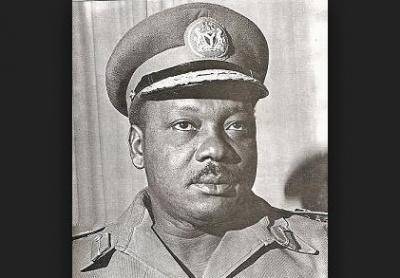Major General Johnson Aguiyi-Ironsi was a Nigerian soldier who led the first military coup in the African nation on this day in 1966. Aguiyi-Ironsi served as Head of State for a few months before he was overthrown and assassinated by army troops.
SEE ALSO: Nigerians Need To Look In the Mirror, If We Wish To Solve Boko Haram Problem
Keep Up With Face2Face Africa On Facebook!
Born March 3, 1924, Aguiyi-Ironsi grew up in what is now present-day Abia State. At 18, he joined the Nigerian Army and excelled as an officer. During the Congo Crisis of the 1960s, the United Nations requested military support from Nigeria. Aguiyi-Ironsi, then a Lieutenant Colonel, led the troops of the United Nations’ mission to keep peace in the Congo.
After returning from the Congo, Aguiyi-Ironsi was appointed as the General Officer Commanding of the Nigerian Army once the former British military command stepped down in light of the country’s still-young independence. Aguiyi-Ironsi assumed his role in February 1965.
On January 14, 1966, soldiers, who were mostly Igbo, were led by Major Chukwuma Kaduna Nzeogwu to take down top political leaders in the northern and western Nigerian provinces.
According to some historical accounts, this led to what was known as the Fall of the First Republic or fall of the Republican Government. Aguiyi-Ironsi, also Igbo, was said to be on a target list to be killed, but he managed to take control of Lagos in the Federal Capital Territory.
Prime Minister Abubakar Tafawa Balewa was overthrown and assassinated by Aguiyi-Ironsi troops on January 15th, and they forced the remaining members of Balewa’s cabinet to resign from their posts.
Aguiyi-Ironsi essentially assumed power the following day.
The killing of Balewa was not looked upon with high favor by many Nigerians in the North, sparking riots and other forms of unrest.
Either way, Aguiyi-Ironsi instructed an acting member who was serving in place of President Nnamdi Azikiwe resign by gunpoint, ultimately ending the First Nigerian Republic.
Watch news coverage of Aguiyi-Ironsi’s coup here:
By this time, Nigeria was split across ethnic and religious groups: It was known to the public that Aguiyi-Ironsi was Igbo and many found it curious that no other Igbo people were killed among the known victims and that many of Aguiyi-Ironsi’s troops were also Igbo.
People in the North began to suspect that Aguiyi-Ironsi showed favor to his own people and was drawing tribal battle lines. Aguiyi-Ironsi did his best to dial down the claims of conspiracy and even offered political appointments to other tribe members.
However, because Aguiyi-Ironsi didn’t put the Igbo coup plotters on trial and placed Igbo people in high-profile political positions, the fear that his ruling was a sort of tribal domination increased.
Aguiyi-Ironsi then issued the Decree No. 34 that did away with the federal government and supplanted it with a unitary system against all advice. The leader believed that this was the only way the military could effectively govern, but it sparked even greater concern from the North.
In his short time in power, Aguiyi-Ironsi issued many decrees that made tensions rise throughout Nigeria.
On July 29, 1966, Aguiyi-Ironsi spent an evening at the Government House in Ibadan as part of a tour he was taking around the country. The leader was alerted by his host, Lieutenant Colonel Adekunle Fajuyi, of a possible mutiny of his army.
Aguiyi-Ironsi tried to avert the counter-coup by altering his Chief of Staff but to no avail: By morning, the Government House was surrounded and led by Theophilus Danjuma who went on to become a prominent businessman. The group arrested the leader and grilled him on his involvement in the coup.
Later, Aguiyi-Ironsi and Fajuyi were both found dead in a forest nearby, their bodies full of bullet holes.
Watch part of the funeral for Aguiyi-Ironsi here:
The circumstances behind their death and how the executions were carried out are unknown but suspected to have been ordered by the subsequent military Head of State Yakubu Gowon.
SEE ALSO: Zanzibar Revolution Took Place On This Day In 1964










